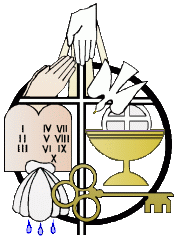The LCMS seems to be abuzz with talk about the idea of visitation. Some folks are positively scared to death by it and others resent it. Some folks insist that it is high time and still others think it is too late. And I guess there are folks like me somewhere in the middle of all of this.
Visitation comes to Lutherans from Luther's own advocacy of a program of visitation. In 1526 or so Martin Luther besought the Elector to appoint episcopal visitors to survey the conditions within the congregations of the realm. It took a few years before the request grew legs but in the end Luther himself ended up doing some of the legwork.
In the end Luther was tortured by what he found. Ignorance among the laity and the clergy shocked Luther into action and his sermonic series and other writings ended up in a form of a catechism or enchiridion (aka handbook) of doctrine and faith. The Large and Small Catechisms were in part a response to the deplorable conditions that were found. There was no shortage of catechisms (some say 30 or more were published in the 6-8 years prior to Luther's two gems so the problem was felt universally. Though not originally polemical, these catechisms became a bit confrontational when the radical reformers began publishing their own catechetical tools. The story was even a Roman Catholic Bishop in Denmark reprinted Luther's Small Catechism for his faithful -- albeit without Luther's name attached.
The truth is that no church body knows what is going on in their congregations without some sort of visitation. This is for Lutherans the primary episcopal responsibility of those leaders of the larger church. We live in an age of abundant communication and yet it is accompanied by increasing isolation among the clergy and parishes of our Synod. Divided and anonymous, the congregations of our church body are known only superficially to those assigned with the responsibility of supervising doctrine and practice.
Without assigning blame, the call of the Harrison stewardship of the Synodical Presidency has been the renewal of the call for energetic and effective visitation. Our pastors and parishes are often amazingly anonymous and isolated in our world of constant communication. This is not a witch hunt but the wise and faithful stewards making sure that blessings and resources of the Lord are known.
I encourage such visitation. None of us can afford to remain isolated and aloof from one another. It is not merely a threat to the Synod, it is threatening to each of us and to the parishes under our care when we as clergy are isolated and disconnected from our brother pastors and our sister congregations. On the one hand, there are those who fear indoctrination and manipulation to enforce a radical orthodoxy that butts heads with the Gospel. On the other hand, there are those who lament at the wrongs that are and who have no idea the rights that have been missed among all the calls to faithfulness and orthodoxy of faith and practice.
Sadly, I will admit to being unsure where I fall. Am I fearful of those who would second guess me in my own parish? Sure. My ego is just as vulnerable as the rest of you. But I am even more fearful that we have lost too much of the distinctive Lutheran confession and piety that binds us better than glue to one another. I hope I am proven wrong in this visitation process, but if I am not, I think that there is no time better than the present to discern the state of the church and begin strategies of renewal that are consistent with our confessional and liturgical identity as Lutheran Christians.
None of us is aimed toward the past. We are not attempting to restore some bygone but esteemed era of Missouri Synod history. What we are hope for is that we will find something to celebrate in terms of our unity and something to work on in terms of our weakness in doctrine and practice. The point is that we will never know if things are pretty good (despite the statisticians and their doomsday scenarios) or if things are as bad as some say. I am not an optimist; my hope is in the Lord. A little personal interaction and visitation is good for us. As long as this visitation remains from from someone's self-appointed policing agenda, I think it will do us good -- it may even hasten the real renewal of confidence in the means of grace and courage to hold up in practice as well the one, holy, catholic and apostolic faith of our confession.
Call me up, Bishop. I am ready to be queried and I might have a few questions for you, too! We are accountable to one another as well as to the Lord. There is no fear in this. But there is great potential for renewal, strengthened unity, and clearer thinking on our purpose and goals as the Church of Jesus Christ our Lord.

In my experience our American individualism leaves too many of us, lay and clergy alike, suspicious of accountability in any form.
ReplyDeleteMy, how positively episcopalian you sound! How will this ever be accepted by LCMSers for who there is no authority beyond the Voters Assembly? (Choke!) Why, this is an open attack on congregationalism!
ReplyDeleteIt is a wonderful idea, and I hope that it really takes off within the LCMS. It could do a world of good.
Fr. D+
Anglican Priest